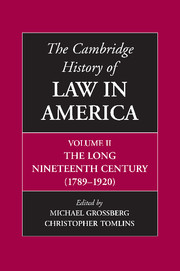Book contents
- Frontmatter
- 1 Law and the American State, from the Revolution to the Civil War: Institutional Growth and Structural Change
- 2 Legal Education and Legal Thought, 1790–1920
- 3 The Legal Profession: From the Revolution to the Civil War
- 4 The Courts, 1790–1920
- 5 Criminal Justice in the United States, 1790–1920: A Government of Laws or Men?
- 6 Citizenship And Immigration Law, 1800–1924: Resolutions Of Membership And Territory
- 7 Federal Policy, Western Movement, and Consequences for Indigenous People, 1790–1920
- 8 Marriage and Domestic Relations
- 9 Slavery, Anti-Slavery, and the Coming of the Civil War
- 10 The Civil War And Reconstruction
- 11 Law, Personhood, and Citizenship in the Long Nineteenth Century: the Borders of Belonging
- 12 Law in Popular Culture, 1790–1920: The People and the Law
- 13 Law and Religion, 1790–1920
- 14 Legal Innovation and Market Capitalism, 1790–1920
- 15 Innovations in Law and Technology, 1790–1920
- 16 The Laws of Industrial Organization, 1870–1920
- 17 The Military in American Legal History
- 18 The United States and International Affairs, 1789–1919
- 19 Politics, State-Building, and the Courts, 1870–1920
- Bibliographic Essays
- Notes on Contributors
- Index
- References
9 - Slavery, Anti-Slavery, and the Coming of the Civil War
Published online by Cambridge University Press: 28 November 2008
- Frontmatter
- 1 Law and the American State, from the Revolution to the Civil War: Institutional Growth and Structural Change
- 2 Legal Education and Legal Thought, 1790–1920
- 3 The Legal Profession: From the Revolution to the Civil War
- 4 The Courts, 1790–1920
- 5 Criminal Justice in the United States, 1790–1920: A Government of Laws or Men?
- 6 Citizenship And Immigration Law, 1800–1924: Resolutions Of Membership And Territory
- 7 Federal Policy, Western Movement, and Consequences for Indigenous People, 1790–1920
- 8 Marriage and Domestic Relations
- 9 Slavery, Anti-Slavery, and the Coming of the Civil War
- 10 The Civil War And Reconstruction
- 11 Law, Personhood, and Citizenship in the Long Nineteenth Century: the Borders of Belonging
- 12 Law in Popular Culture, 1790–1920: The People and the Law
- 13 Law and Religion, 1790–1920
- 14 Legal Innovation and Market Capitalism, 1790–1920
- 15 Innovations in Law and Technology, 1790–1920
- 16 The Laws of Industrial Organization, 1870–1920
- 17 The Military in American Legal History
- 18 The United States and International Affairs, 1789–1919
- 19 Politics, State-Building, and the Courts, 1870–1920
- Bibliographic Essays
- Notes on Contributors
- Index
- References
Summary
Enslaved African Americans who escaped to freedom wrote bitterly of the role of law in maintaining the institution of slavery. Harriet Jacob emphasized the law’s refusal to act on behalf of slaves. The enslaved woman or girl had “no shadow of law to protect her from insult, from violence, or even from death.” Frederick Douglass focused on the way law did act, turning human beings into property: “By the laws of the country from whence I came, I was deprived of myself – of my own body, soul, and spirit … ” Whether through its action or inaction, slaves recognized the immense power of law in their lives.
Law undergirded an economic system in which human beings were bought, sold, and mortgaged and a political system in which two sections of the United States coexisted profitably, one a slave society and one not. As we know, this coexistence did not last, and it is tempting to read back into the antebellum period an instability in the legal edifice supporting slavery that made its collapse inevitable. Yet, as both Douglass and Jacobs realized, the law worked remarkably well for a long period to subordinate human beings one to another, though not without considerable effort in the face of contradiction, internal conflict, and external challenge. Southern slaves and Northern abolitionists, in very different ways, posed a threat to the law of slavery, and it took work to overcome those threats. Ultimately, however, it was a bloody civil war, and not a legal process, that resolved the contradictions of human property.
- Type
- Chapter
- Information
- The Cambridge History of Law in America , pp. 280 - 312Publisher: Cambridge University PressPrint publication year: 2008
References
- 1
- Cited by

